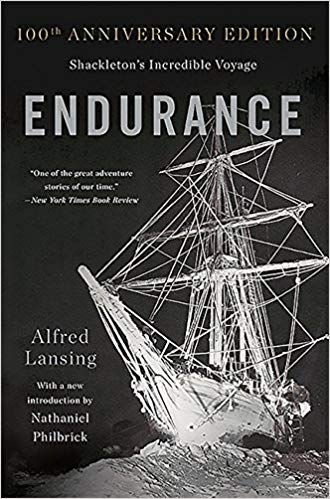Endurance: Shackleton’s Incredible Voyage – by Alfred Lansing
Date read: 5/18/19. Recommendation: 8/10.
A brilliant tale of survival that documents Sir Ernest Shackleton’s failed voyage to cross Antarctica from west to east. Shackleton often appears as a larger-than-life character, offering lessons in leadership at every turn. But Lansing balances this by bringing in the perspective of the other twenty-seven crewmen. It’s one of those true stories that you could never dream up. Lansing highlights the importance of meaning, self-reliance, and gratitude in extreme conditions (à la Tribe by Sebastian Junger or Man’s Search for Meaning by Viktor Frankl). It’s also beautifully written. I stopped multiple times to rewrite passages out of admiration, hoping to steal a touch of Lansing’s style.
See my notes below or Amazon for details and reviews.
My Notes:
Imperial Trans-Antarctic Expedition:
Goal was to cross the Antarctic continent overland from west to east. Set out on October 26, 1914 from Buenos Aires with 27 men and Sir Ernest Shackleton at the helm. On January 19, 1915 became trapped in icy wasteland of the Weddell Sea midway between the South Pole and nearest known outpost of humanity, 1,200 miles away.
After initial departure: “And in the space of a few short hours, with a thousand petty problems, to one of the barest simplicity in which only one real task remained–the achievement of the goal.”
Shackleton:
Purposeful, bold, neat.
“But if it hadn’t been audacious, it wouldn’t have been to Shackleton’s liking. He was, above all, an explorer in the classic mold–utterly self-reliant, romanic, and just a little swashbuckling.”
“Whatever his mood–whether it was gay and breezy, or dark with rage–he had one pervading characteristic: he was purposeful.”
Intensely aware of those who might undermine unity of group. Knew overall energy and attitude could be difference between life and death. Shackleton made tent, job, crew, and rescue-team assignments based on personality and demeanor. He knew how to motivate each man and preserve the morale of the team. Feared demoralization more than the cold, ice, or sea.
Shackleton believed in his own invincibility. His confidence fueled his men and is what made him a great leader. But it’s also what blinded him to realities and led to occasional poor decisions.
Plans changed constantly as they drifted one direction or another. But Shackleton always operated with conviction. Being a great leader isn’t about accuracy. It’s about conviction and adaptability (strong opinions, loosely held).
Frozen in ice:
“Thus their plight was naked and terrifying in its simplicity. If they were to get out–they had to get themselves out.”
After the ship getting stuck (and knowing they were going to have to make it through an entire winter of polar nights), the men grew closer. Built camaraderie through regular social occasions–Saturday night grog, Sunday night music, a lantern chat with a slide-illustrated lecture (once/month), dogsledding, and hockey.
After nine months, abandoned the Endurance and made camp on a large floe. Men responded well because indecision and speculation were over. Knew what needed to be done. Shackleton knew not to let ambiguity linger for too long. Conviction > indecisiveness.
Gratitude and meaning in extreme conditions:
“The rapidity with which one can completely change one’s ideas…and accommodate ourselves to a state of barbarism is wonderful.” Worsley
“They had been on the ice just a month. And for all the trials and discomforts, these weeks of primitive living had been peculiarly enriching. The men had been forced to develop a degree of self-reliance greater than they had ever imagined possible.”
*See Tribe (Sebastian Junger) and Man’s Search for Meaning (Viktor Frankl)
“What an ingrate I have been for such jobs when done for me at home.” Macklin
“One of the finest days we have ever had…a pleasure to be alive.” Greenstreet
“In some ways they had come to know themselves better. In this lonely world of ice and emptiness, they had achieved at least a limited kind of contentment. They had been tested and found wanting.”
Boredom is a fiercer foe than hardship:
“The monotony of life here is getting on our nerves. Nothing to do, nowhere to walk, no change in surroundings, food or anything.” Greenstreet
Speed > preparedness:
When they abandoned ship, Shackleton urged the crew to leave behind anything that wasn’t absolutely essential for survival. To demonstrate this, he tore a page from the Book of Job in his Bible, set the book in the snow and walked away. In his studies of past expeditions, knew that crews who brought equipment for every imaginable scenario fared worse than those who sacrificed preparedness for speed.
Ferocity of the sea:
“But the sea is a different sort of enemy. Unlike the land, where courage and the simple will to endure can often see a man through, the struggle against the sea is an act of physical combat, and there is no escape.”

